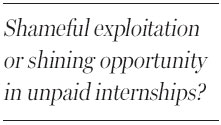Recounting the cost of free labor
Updated: 2013-11-10 07:58
(The New York Times)
|
|||||||
It's not frightening like "Revenge of the Zombies," nor funny like "Revenge of the Nerds," but it's happening: "Revenge of the Unpaid Intern." It's not a movie and it may be coming to an employer near you.
Revenge has come in the form of dozens of lawsuits in recent months - first in the United States, but now being filed throughout Europe - charging that some companies that offer low-pay or no-pay internships to eager young workers are engaged not in education, but exploitation.
The movement is shaking up the unpaid world of work.
In June, the movie studio Fox Searchlight was found guilty of paying interns below minimum wage for work on the film "Black Swan." Late last month, the big media company Conde Nast announced that it was ending its influential internship program after being sued by two former interns. (United States law says unpaid internships at profit-making companies are legal, but must offer an "educational environment" in exchange.)
Some say the intentions of former interns suing companies where they worked for low pay, or no pay at all, are not exactly noble. And while employers have their defenders, the cause was not helped when a 21-year-old Bank of America intern in London died this summer of epilepsy after working three straight days with little sleep.

People like Ross Perlin, who wrote "Intern Nation," believe that internships are a way for companies to get free labor to replace the essential work of thousands of laid-off employees. "For too many people, internships have become slightly shameful, with overtones of menial work, immaturity, parental dependence and being stuck," he wrote in The Times. "As long as the current system remains stubbornly in place, expect the intern revolt to continue."
Others are calling for revolt against the work-for-free mentality far beyond internships. For the humor essayist Tim Kreider, the injustice takes the form of the digital-age devaluation of "content," formerly known as art and writing: "People who would consider it a bizarre breach of conduct to expect anyone to give them a haircut or a can of soda at no cost will ask you, with a straight face and a clear conscience, whether you wouldn't be willing to write an essay or draw an illustration for them for nothing," he wrote in The Times. "They often start by telling you how much they admire your work, although not enough, evidently, to pay one cent for it."

Mr. Kreider concludes that times have changed: "This is partly a side effect of our information economy, in which 'paying for things' is a quaint, discredited old 20th-century custom, like calling people after having sex with them." But he urges his readers to resist giving their work away for free. "It shouldn't be professionally or socially acceptable - it isn't right - for people to tell us, over and over, that our vocation is worthless."
But those prospective college students untroubled by ethics of a dog-eat-dog economy might want to take the entirely practical route and check in with PayScale.com, which ranks colleges strictly by the mid-career median salaries of their graduates. In that case, the optimum choice might not be Yale University (12) or Columbia University (54) but the lesser known Harvey Mudd College (1), a small private institution in California with fewer than 1,000 students. The college's president, Maria Klawe, told The Times that the median starting salary for last year's graduates who took jobs was over $77,000. More than 20, she said, found jobs with salaries over $100,000, and one a few years ago secured a job with a $280,000 starting salary. How did he do it?
He designed a high-speed trading algorithm, she said, during his summer internship.
PETER CATAPANO
(China Daily 11/10/2013 page9)